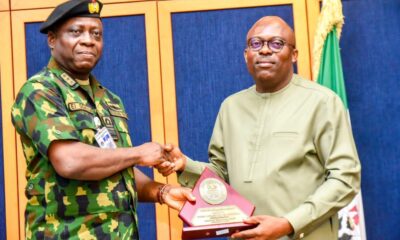Sports
Mexico Brings Perfect End Memory To 2011 U-17 W/Cup
Mexico’s merry band of tomorrow’s stars were crowned U-17 World champions last weekend on the hallowed ground at the fabled Estadio Azteca, the very same turf where the likes of legends Diego Maradona and Pele had some of their most iconic moments. Uruguay spilled the inevitable bitter tears on the night, so close yet so far to a first title in the junior category.
While the final itself was as tense and tightly played a game as we’ve seen at this FIFA U-17 World Cup, the match for third place was a spectacle of open play, goals and carefree football. Germany beat Brazil 4-3 with the crowd treated to a dazzling undercard.
The goal of the day wasn’t the prettiest goal of the tournament, but the reaction from the nearly 100,000 fans at the Azteca to the clinical counter-attack in the closing moments of the final was nothing short of bombastic. Collecting the ball from Arturo Gonzalez as the Uruguayans were stretched in search of a late equaliser, the super-sub extraordinaire slammed into the side netting to put the final result beyond doubt and spark scenes of unparalleled joy in the Mexican capital.
It was strange to see fans at the Azteca supporting Germany so fervently, especially just days after the semi-final where the Germans gave the home side a fright and were subjected to all manner of insults and abuse from the Torreon faithful. But the attacking nature of this German team is nothing short of infectious and the fans appreciated Samed Yesil and Co’s outstanding display as they bested Brazil to finish the tournament with the best attacking record, a full 24 goals scored in seven games. Green-clad Mexican supporters threw sombreros down to the bashful Germans and blew kisses as the junior Nationalmannschaft did an impromptu victory lap after the final whistle. Coach Steffen Freund even donned one of those oversized traditional Mexican hats at the post-game press conference, saying “adios” and “muchas gracias” with a wide smile in his best, broken Spanish.
While they did seem to care for the Germans a great deal, the Azteca fans’ one true love remained their young El Tri. And though it is a cliché to talk about the 12th man and its influence in football, the power of the hulking stadium itself seemed to count for much down on the pitch. The first glimpse the massive crowd got of their young heroes was not during the final itself. While Germany and Brazil traded goals in the third-place game, the Mexican players stuck their heads out of the tunnel for a brief second. The roar that greeted the cameo was as explosive and joyful as the cacophony of whistles, boos and clenched fists that greeted the Uruguayans’ first appearance. It was a hint of things to come as the huge crowd at the mighty Azteca roared, shouted, chanted, ‘Cielito Lindo-d’ and ‘ole-d’ the boys on to a 2-0 win and a second U-17 world title.
The enduring affection for star midfielder Julio Gomez simply could not be contained. The Pachuca man single-handedly put Mexico into the final after scoring twice and playing on with a bloody head injury in the semi-final win over Germany. He started the final on the bench, but the fans, many of them wearing bandages on their head in his honour, chanted his name all night long. He received the biggest roar when he finally entered the pitch, head still bandaged, mid-way through the second half. The gathered media, most of them Mexican, also voted with their hearts, voting him the adidas Golden Ball winner as tournament top player by a wide margin.
The number of fans that filed through the gates at the massive Azteca for the final of the U-17 World Cup was 98,943. The fans turned out in their numbers to support the home side’s charge to the title, and in doing so they broke the record for the largest final-day crowd in the tournament’s 26-year history. The average attendance for Mexico 2011’s 52 games stands at 19,275.
Sports
Siasia Blames NFF Over FIFA Ban
Former Super Eagles Coach, Samson Siasia says the Nigeria Football Federation supported FIFA to have him banned for alleged involvement in match-fixing in August 2019.
In a recent interview with Athlist, the 56-year-old, whose ban ends in a few months, said the NFF not only refused to support him but also carried out FIFA’s instruction not to let him know he was under investigation by the world football body.
“Nigeria abandoned me at that time of need; that’s my own take on how this thing played out,” the former Eagles striker and member of the 1994 AFCON-winning squad, said.
“It’s an allegation; they said bribery. What is bribery? Is it not when money changes hands? Was there any proof of that? There were none.
“I spoke with someone who was trying to hire me as a coach in Australia. I didn’t know the guy was a match-fixer, but FIFA knew this guy. Why would they allow him to be around any FIFA tournament?
“So, when they found out through emails, our correspondence about how this guy would take me to Australia, I played in Australia, so I felt it would be nice to go back there.
“We talked about how much salaries, transfers, bonuses, and sign-on fees were, and that was all.
“When FIFA was looking for me, I didn’t even know. I am not affiliated with FIFA; their affiliation is with the NFF. So, they went to the NFF and told them not to let me know that they were investigating me. But if they didn’t tell me, how was I supposed to defend my self Siasia added, “Then they sent me a letter, but it went to my spam. It was two days before the ban that I found out that FIFA was looking for me.
Siasia added, “Then they sent me a letter, but it went to my spam. It was two days before the ban that I found out that FIFA was looking for me.
“Then we started to see how we could communicate with them to see how I could have a hearing. But they said the time had elapsed and I should go to the CAS (Court of Arbitration for Sport).
Sports
WADA Plans Review Of Failed Tests
The World Anti-Doping Agency (WADA) will launch an independent review after 23 Chinese swimmers were cleared to compete at the Tokyo Olympics despite testing positive for a banned substance.
WADA has said it was not in a position to disprove an assertion from the China Anti-Doping Agency (CHINADA) that contamination was the source of the heart medication trimetazidine (TMZ) for which the swimmers tested positive.
Findings of the independent investigation, led by Swiss prosecutor Eric Cottier, are expected to be delivered within two months.
“WADA’s integrity and reputation is under attack,” said Wada president Witold Banka.
“WADA has been unfairly accused of bias in favour of China by not appealing the CHINADA case to the Court of Arbitration for Sport.
“We continue to reject the false accusations and we are pleased to be able to put these questions into the hands of an experienced, respected and independent prosecutor.”
United States Anti-Doping Agency (USADA) Chief Executive Travis Tygart said WADA and CHINADA had swept these positives under the carpet, claims WADA described as completely false and defamatory while adding that it had referred the comments to its lawyers.
Aquatics GB said it was extremely concerned by the allegations, which it said threatened “potential loss of trust and reputational damage to sport”.
WADA was notified of CHINADA’s decision in June 2021, ahead of the delayed Games, and said it had no evidence to challenge China’s findings and that external counsel had advised against appealing.
In addition to the independent investigation, WADA said it will send a compliance audit team to assess the state of China’s anti-doping programme and invite independent auditors “from the broader anti-doping community” to join the trip.
WADA director general Olivier Niggli said: “While not one shred of evidence has been presented to support any of the allegations made against WADA, we wish to deal with the matter as quickly and as comprehensively as possible so that the matter is appropriately handled in advance of the upcoming Paris Olympic and Paralympic Games.”
Details of the positive tests were revealed by the New York Times, which shared reporting with German broadcaster ARD.
China won six swimming medals at the Tokyo Olympics, including three golds.
Sports
AFN Lists Strong Squad For Bahamas Relays
The Athletics Federation of Nigeria has listed Tobi Amusan, Favour Ofili and Omolara Ogunmakinju among the athletes to represent the country at the World Athletics Relays at the Thomas A. Robinson National Stadium in Nassau on May 4 and 5.
The body shockingly left out Favour Ashe, Nigeria’s fastest man so far this year, who would have helped Nigeria secure a 4x100m slot at the Paris 2024 Olympic Games.
The Auburn University undergraduate has been in great form this outdoor season, breaking 10 seconds twice (9.96 and 9.99).
The 21-year-old was not among the 29 names World Athletics released on Tuesday in the final entry list by Nigeria for the event, and AFN has yet to give reasons for its decision t Meanwhile, Godson Oghenebrume and Udodi Onwuzurike head the list of eight sprinters listed for the men’s 4x100m event.
Others are Alaba Akintola, Karlingthon Anunagba, Consider Ekanem, Seye Ogunlewe and Israel Okon Sunday.
The team will strive to be among the best 14 finishers to secure a lane in Paris for the first time since 2008, when the quartet of Onyeabor Ngwogu, Obinna Metu, Chinedu Oriala, and Uchenna Emedolu did not finish in the first heat of the event at the Bird’s Nest in Beijing, China.
For the men’s 4x400m, African Games 400m champion Chidi Okezie headlines the list of eight quarter milers listed to return Nigeria to the Games since 2004, when Godday James led the team to a bronze medal finish in Athens, Greece.
Others are Sikiru Adeyemi, Dubem Amene, Ezekiel Nathaniel and his brother, Samson Nathniel, Dubem Nwanchukwu, Samuel Ogazi, who has been improving since his switch to the University of Alabama and holds the Nigerian U-18 record and Ifeanyi Ojeli.
-

 News3 days ago
News3 days agoJAMB Arrests Father For Impersonating Son At Exam Centre
-
Women3 days ago
The Desire Of Every Woman In Marriage
-

 Featured3 days ago
Featured3 days agoBe Firm In Fight Against Oil Theft, Fubara Tells CNS …As Navy Moves Training Hqtrs To Rivers …Seizes 14 Vessels In Three Months
-
Business3 days ago
Diri Tasks NCDMB, SPDC On Projects Completion
-
Politics3 days ago
Fubara’ll Leave Rivers Better Than Expected – LG Boss
-
Sports3 days ago
Eaglets Held In Pre-WAFU Friendly
-

 News3 days ago
News3 days agoRHI: Lady Fubara Donates 50,000 Books To Public Schools In Rivers
-
Women3 days ago
The Wise Woman

